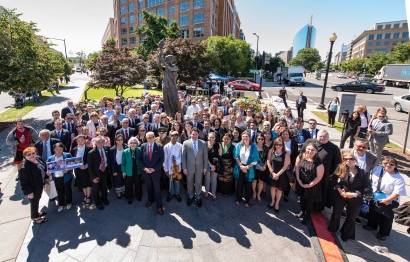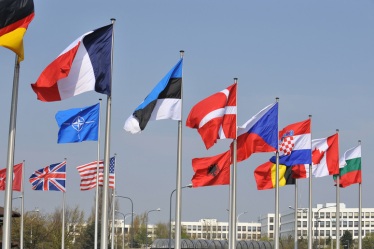EANC’s sister organization from the Central and East European Coalition (CEEC) representing Ukrainian Americans held an advocacy event on June 14 in Washington to call attention to legislation relevant to ending the conflict in Ukraine. The Ukrainian Congress Committee of America (UCCA) together with the Ukrainian National Information Service (UNIS) sponsored their thrice-yearly “Ukraine Days” advocacy event on June 14th and were reinforced by EANC and JBANC support.

EANC and JBANC reps join Ukrainian-American advocates in meeting with Senator Feinstein Legislative Correspondent Anup Rao (second from left). Photo courtesy of JBANC.
The program included a morning briefing session with leaders of the Ukrainian-American community from throughout the U.S., followed by visits to both Senate and House members’ offices. EANC Washington, DC Director Karin Shuey and JBANC Managing Director Karl Altau, along with JBANC interns Lina Sullivan, Ojars Berzins, Elīna Dīce, and Anete Rožukalne, joined the team of Ukrainians from Virginia and California to visit offices representing those states. During the course of the day, they met with staff working for California Senator Dianne Feinstein and Virginia Representatives Don Beyer and Barbara Comstock. Since one of the Ukrainian-American advocates was a constituent of Representative Dana Rohrabacher, he made time to meet with the group himself for a lively and sometimes contentious discussion of the issues. This group also included a Crimean Tatar and a Georgian soldier who volunteered in the fighting in eastern Ukraine. The day ended with a reception in the Capitol, offering another opportunity to discuss issues with Members of Congress and staff and other friends of Ukraine.
This event works in parallel with EANC’s and JBANC’s mission, including JBANC’s biennial security conference, in calling attention to the legislation and issues that impact

Representative Rohrabacher (back row, second from right) meets with Ukrainian- and Russian-Americans, along with EANC and JBANC reps. Photo courtesy of JBANC.
the nations along Russia’s border. Much of the legislation JBANC supports is the same as that highlighted on this advocacy day. By reinforcing Ukrainian priorities in Congress, JBANC and EANC also bolster the cause for democracy, border integrity, fair elections, rule of law, military and diplomatic cooperation, and other democratic principles and institutions that form the foundations of European security and a stable world order.
EANC and the other member organizations of the CEEC will continue to work together to keep Congress focused on our common interests. While the Estonian-American community makes up a small percentage of most congressional district populations, teaming up with the communities from our former Soviet Republic and Warsaw Pact neighbors, our voices become much stronger and more likely to get the attention of our lawmakers. Our ongoing work with the CEEC produces policy statements and press releases, summaries of relevant legislation that we distribute on the Hill, and forums for Congressional staffers and members of the foreign policy community that draw high-level speakers to shine a light on the hottest topics affecting our region. For more information on the CEEC, please visit www.ceecoalition.us.



